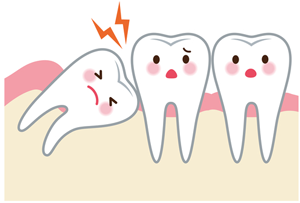The term “gum disease” is one that you hear often. Almost every commercial or advertisement for toothpaste, mouthwash, toothbrushes or even floss mentions it. Even though the term is so prevalent, many people don’t really know exactly what it means or the affect that it can have. With that in mind, we’ve put together a quick fact sheet for you to help you learn the basics:
- Gum disease is a lay-term. Around the office and to other medical professionals, your dentist will say “periodontal disease”. You may have heard both terms. They are, in fact, the same thing.
- Almost everyone will have some form of gum disease at some point in their lives.
- Early gum disease is called “gingivitis”, another term commonly heard in advertising. Gingivitis is typically caused by not cleaning the teeth and mouth enough. This allows food particles to be left behind or for plaque to build up excessively. Plaque is full of bacteria and if not removed from the teeth regularly, that bacteria can cause the gums to become infected and inflamed. Gingivitis typically causes almost no pain (which is part of the reason so many people miss it), just swelling, redness and bleeding of the gums. If you often bleed when you brush your teeth, you likely have a problem with gingivitis.
- Gingivitis is relatively easy to treat! Increased oral care at home combined with some professional treatments like a deep cleaning, antibiotics or a medicated mouthwash can be all it takes to get gingivitis under control.
- More advanced gum disease is called “periodontitis”. In this case, the plaque that causes gingivitis has spread and begun to grow below the gum line and irritated the gums to the point that inflammation is chronic. When this happens, the body begins trying so hard to fight the infection that it begins to destroy its own tissue. Gums and bone are attacked and dissolved away, causing pockets of infection, deterioration of the jawbone and loosened or lost teeth. As dramatic as this sounds, believe it or not it all happens with little to no pain in most cases.
- Periodontitis is pretty common. If you’re over 30 years old, you have a little higher than 1/3 chance that you have periodontitis.
- Smoking is thought to be responsible for about half of all cases of gum disease in adults.
- Patients with diabetes or other situations that reduce the immune system (pregnancy, HIV, cancer, certain medications, etc.) are at an increased risk for gum disease.
- Gum disease has been linked to heart disease, respiratory disease, low birth weight and more.
- As mentioned above, most gum disease doesn’t hurt. Since most people think of pain as one of the bodies first signals that something is wrong, it’s easy to miss the ways your body is trying to communicate gum disease. Here are some signs and signals to look out for
- Gum redness and swelling: This can be difficult since most people don’t look at their gums closely enough or often enough to be able to tell if they’re a different color or bit swollen. Make a habit of inspecting your gums when you brush and you’ll be in a much better position to not miss this sign.
- Bleeding: Brushing and Flossing shouldn’t make you bleed. If it does, it’s probably because your gums are swollen and much more sensitive than normal due to infection.
- Loose or shifting teeth: If you’re noticing your teeth are loose or that spaces between them are changing, this is a tell-tale sign of advanced gum disease. It can sometimes be caused by loss of underlying bone. With little to no bone to hold the tooth in place, it wriggles and shifts.
- “Flappy gums”: There is an old saying “flapping your gums” that means you’ve been talking too much. I don’t mean that. I mean literal flaps in your gums. As the gum tissue separates from the teeth it can create a section that moves freely as opposed to sticking to the tooth.
- Bad breath: Everyone gets bad breath from time to time, but if it’s persistent no matter how often you brush your teeth, you probably have some sort of oral disease or decay.




